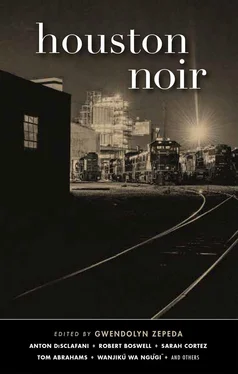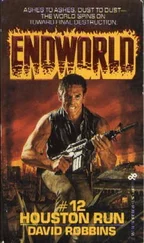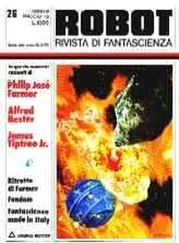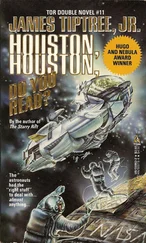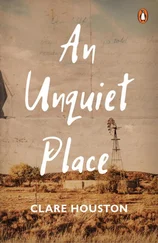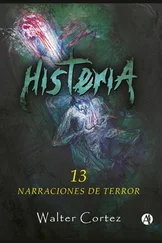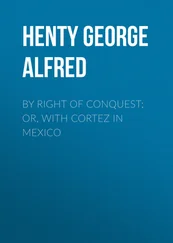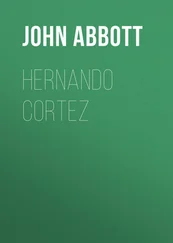Sarah Cortez - Houston Noir
Здесь есть возможность читать онлайн «Sarah Cortez - Houston Noir» весь текст электронной книги совершенно бесплатно (целиком полную версию без сокращений). В некоторых случаях можно слушать аудио, скачать через торрент в формате fb2 и присутствует краткое содержание. Город: New York, Год выпуска: 2019, ISBN: 2019, Издательство: Akashic Books, Жанр: Детектив, на английском языке. Описание произведения, (предисловие) а так же отзывы посетителей доступны на портале библиотеки ЛибКат.
- Название:Houston Noir
- Автор:
- Издательство:Akashic Books
- Жанр:
- Год:2019
- Город:New York
- ISBN:978-1-61775-706-8
- Рейтинг книги:3 / 5. Голосов: 1
-
Избранное:Добавить в избранное
- Отзывы:
-
Ваша оценка:
- 60
- 1
- 2
- 3
- 4
- 5
Houston Noir: краткое содержание, описание и аннотация
Предлагаем к чтению аннотацию, описание, краткое содержание или предисловие (зависит от того, что написал сам автор книги «Houston Noir»). Если вы не нашли необходимую информацию о книге — напишите в комментариях, мы постараемся отыскать её.
Houston Noir — читать онлайн бесплатно полную книгу (весь текст) целиком
Ниже представлен текст книги, разбитый по страницам. Система сохранения места последней прочитанной страницы, позволяет с удобством читать онлайн бесплатно книгу «Houston Noir», без необходимости каждый раз заново искать на чём Вы остановились. Поставьте закладку, и сможете в любой момент перейти на страницу, на которой закончили чтение.
Интервал:
Закладка:
“Claro que sí.”
In her car, Xitlali watches the Ruiz family walk back into the trailer, one by one. She wonders if they will be safe.
Her gente, spreading into spaces where they weren’t allowed before. Opening new traumas and wounds that will take years and lifetimes and generations to even diagnose. New manifestations of spirits, dark energy, and evil entering into our reality, evolving within these transitions. Then comes the work of accepting past truths. Reconciliation. She will always have work. There will always be a need for her services.
I’m so tired.
Xitlali drives back into the city on the great spine of the freeway that connects the suburbs, where people like her work and clean, to the skyscrapers, where people like her work and clean. The drive feels like a dream, the passing billboards and landscapes acting as newsreels for the imagination. Over yonder, the light from the sleepless metropolis fights with the darkness of the cosmos above.
Xitlali will drive these freeways many times over the coming years. She will take her daughter’s picture from the glove box and tape it, again, to her dashboard. It would behoove her to come to peace with herself, her past, with what she’s done. That’s another story. For now, Xitlali Zaragoza, curandera, will rest as much as she can until her next assignment.
Photo Album
by Sarah Cortez
Downtown
There’s a place I remember perfectly without a photo. A hotel lobby, with its shabby wingbacks and dirty octagonal floor tiles just inside the wide doors. Dust motes circling in hot afternoon air. The smell of chlorine on my skin as I walked from the car through the broiling downtown sidewalks’ reflected heat. The stolen keys in my pocket. Hot metal grazing my thigh at each step. I was crazy with longing, crazy to feel his quick rise. He wasn’t there anymore. That’s what the old clerk at the front desk said, his eyes going too bright, going down to where they shouldn’t. Okay , I said. Okay . I wasn’t going to die.
This picture is the new house Dad bought us, close to the airport, near his work. A bare yard with no trees, scattered grass; a neighborhood with almost no people. My small tan-and-white dog dead of a broken heart. Old English. A clean pad of concrete for a circular patio in the back. A built-in vanity for Mom with two shades of brown tiles shaped like leaves. Daddy also bought Mom a new car. For her long commute — too long to ride the bus anymore, as she’d always done. She didn’t even try to plant flowers in the flowerbeds this time.
He wouldn’t let me take a photograph of him. Once I even brought my Instamatic upstairs to his room. Late-afternoon sun across the short golden hairs of his belly. Sparks of the sun’s fire in each lower curlicue. His blue eyes blazing with a light I couldn’t define and didn’t need to. Sheets pushed off the foot of the bed, onto a dismal braided rug. Strong, tanned fingers girding my pelvis. Wordless time spent with a man who didn’t need words to convince me to be with him. I remembered him from before, when he’d worked for my dad doing yardwork, then at the airport hangar. You gotta give people a chance, Dad liked to say. Everybody deserves a chance.
Oh, that’s Frankie Petras, the boy I had such a crush on back in grade school. We were both so shy. He had blue eyes too. He never would’ve asked me to steal. I think the only conversation we had in twelve years of grade school was the day Kennedy was shot. We talked by the bike racks after school, where we’d prayed for hours for a miracle. We prayed until they pronounced him dead — the man we’d seen the day before at Rice. Frankie started crying — a thirteen-year-old boy crying in public — as we stood holding our bikes. I stood mute, watching fat tears squeeze from under eyelids he tried to shutter with a thumb and crooked index finger. A few moments later, he turned without a word, undid his bike lock, and pedaled away without once looking back. His body, a slender torch burning, consumed by grief and betrayal. At home that night, none of us could speak of it. And what would’ve been the point? There were no answers to the whys. Nothing beyond our sadness and loss.
Our confirmation class between the front pillars of the church. After Mass, the men talked in groups, without their wives and kids. Clean-jawed, still-athletic World War II vets like my dad. Grim and silent, they returned to walk us to the cars. Every Sunday became a litany of defeats — more families driven out by the blacks as they block-busted South MacGregor, someone’s watch dog murdered, the Sakowitz mansion sold for pennies. You see, even the Jewish families moved out, fled to Braeswood. Mom would try to talk about something cheerful as we drove home. Beneath her summertime straw hats, I’d see her forced smiles in Charles of the Ritz’s reddest lipstick. Only grunts from Dad’s side of the car, if that much. We started going out for breakfast after church, instead of cooking at home like we’d always done. The smell of pancakes and bacon frying in cast iron no longer felt safe. Anything could happen, at any moment.
I wish I had just one photograph of our old neighborhood before all this started: The enormous white antebellums along Braes Bayou, with acres of undulating beauty beneath long-armed oaks. The large yards, restful. Every spring, I waited to glimpse the azaleas — a six-foot-tall solid wall of vibrant pink next to the long white porches. We lived several blocks south of there, in the middle-class section where all the streets were named after the South’s beauty: Charleston, Tampa, Shenandoah, Allegheny, Ozark.
Near the end, I couldn’t walk half a block down our street to my friend Miriam’s. Mom still hadn’t learned to drive and refused to go to the neighborhood grocery without Dad. Her lips were pursed and eyes serious all the time, especially when she thought I wasn’t watching. When Dad got home from work, he wouldn’t drink his highball. I have to be ready , he’d say. I don’t know when they’ll come. The voices who called us at night had promised rocks, firebombs, bullets. The voices of people we’d never met. Did we pass them at the grocery store on Saturdays? Did we sit with them on the downtown bus? Were these the husbands and sons of the black ladies who called me honey chile and smiled in radiant friendship while patting my cheeks?
I don’t have an outside photo of the place he lived. A run-down three-story hotel downtown on Caroline. Painted-over yellow-brown brick. Squares of glass windows on the first floor as if it had a diner inside. Red neon on the outside advertising Pecan Waffles in block letters — food that didn’t exist. That wasn’t why I stopped. His room was on the second floor.
His strong, sinewy arms were perfectly tanned. Nails split from the yardwork, the lawn mowers and the tools. But always clean khakis with a crease when I was there. A thin belt around a trim waist. An ease of movement that, even back then, I would’ve described as graceful. Calm. Purposeful. Never rushed. A strong tongue. The barbed wedge called loss cutting into my sternum from underneath, where no one could touch its excruciating facets — not even him. Besides, we didn’t talk much. That’s part of why I remember so clearly when he told me to get a copy of Mom’s car keys — both of them, ignition and trunk. We could drive to his folks’ farm — farther south, near Victoria. He’d introduce me to his mom. I’d just have to make up a reason to get away for a Saturday. I did sports — it’d be easy. Piece of cake.
Those damn high school photographs. Crooked grins and a patchwork of colorful optimism and plans for bright futures, full of achievement. The hidden truths of hatred and fear I’d learned during that last year in our old home. All of it swallowed but stuck partway down your gullet. Terror that what you retched up would be your heart. The one thing you wanted: to be truly dead so you’d forget all those childhood things you loved that had been taken away by people you didn’t even know well enough to hate. Your heart, the only thing you’d convinced yourself you could kill with no one noticing.
Читать дальшеИнтервал:
Закладка:
Похожие книги на «Houston Noir»
Представляем Вашему вниманию похожие книги на «Houston Noir» списком для выбора. Мы отобрали схожую по названию и смыслу литературу в надежде предоставить читателям больше вариантов отыскать новые, интересные, ещё непрочитанные произведения.
Обсуждение, отзывы о книге «Houston Noir» и просто собственные мнения читателей. Оставьте ваши комментарии, напишите, что Вы думаете о произведении, его смысле или главных героях. Укажите что конкретно понравилось, а что нет, и почему Вы так считаете.
